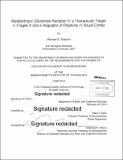Metabotropic glutamate receptor 5 : a therapeutic target in Fragile X and a regulator of plasticity in visual cortex
Author(s)
Sidorov, Michael S. (Michael Samuel)
DownloadFull printable version (18.34Mb)
Alternative title
Therapeutic target in Fragile X and a regulator of plasticity in visual cortex
Other Contributors
Massachusetts Institute of Technology. Department of Brain and Cognitive Sciences.
Advisor
Mark F. Bear.
Terms of use
Metadata
Show full item recordAbstract
The synaptic proteins Fragile X mental retardation protein (FMRP) and metabotropic glutamate receptor 5 (mGluR5) act in functional opposition to regulate local translation of synaptic mRNAs. Fragile X is the most common form of inherited intellectual disability and autism, and is expressed by a loss of FMRP. Previous studies have implicated mGluR5 in the pathogenesis of the disease, but a crucial unanswered question is if pharmacological mGluR5 inhibition is able to reverse an already established FX phenotype. Here we use the novel, potent and selective mGluR5 inhibitor CTEP to address this issue. Chronic treatment beginning in young adulthood results in comprehensive phenotype correction, suggesting that FX is in part a disease of acutely altered synapses. These results hold promise for clinical trials currently underway using similar approaches. Identifying mouse phenotypes to model cognitive impairment is especially important in FX because intellectual disability is at the core of the disorder. Here, we describe instrumental extinction as an assay for testing cognitive function, and report that this process is altered in FX model mice. In parallel, we characterize the role of mGluR5 in regulating synaptic and experience-dependent plasticity in wild-type mouse visual cortex. We report that NMDA receptor-dependent long-term depression (LTD) is reduced specifically in layer IV of visual cortex in mGluR5 knockout mice, as well as in wild-type mice treated chronically with CTEP. However, LTD induction is normal in the presence of acute mGIuR5 antagonism in wild-type mice, suggesting an important difference between acute and chronic mGluR5 function. In vivo, monocular deprivation results in experience-driven weakening of synaptic strength, which occurs through similar mechanisms as LTD in vitro. We report that this ocular dominance plasticity is impaired following chronic mGluR5 inhibition. This study shows that specifically in layer IV, chronic but not acute downregulation of mGIuR5 signaling has important consequences for forms of NMDA receptor-dependent plasticity in vitro and in vivo. Taken together, this work addresses both the basic function of mGluR5 as a regulator of plasticity and its potential as a therapeutic target in Fragile X.
Description
Thesis: Ph. D., Massachusetts Institute of Technology, Department of Brain and Cognitive Sciences, 2014. Cataloged from PDF version of thesis. Vita. Includes bibliographical references (pages 160-185).
Date issued
2014Department
Massachusetts Institute of Technology. Department of Brain and Cognitive SciencesPublisher
Massachusetts Institute of Technology
Keywords
Brain and Cognitive Sciences.